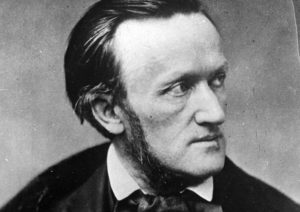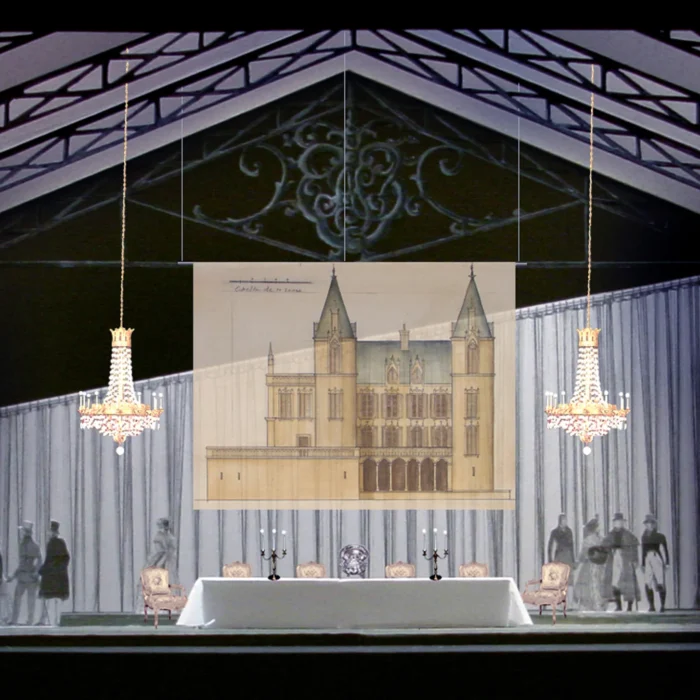
Twilight of the Post-War Order – Understanding a Cruel World through Wagner’s ‘Ring Cycle’
By Cyrus TahbazMuch ink has been spilled, in varying shades of nostalgia, on the unravelling of the contracts, institutions, and principles that have fostered peace and prosperity since the end of the Second World War. Undoubtedly, much of this concern is justified: in Europe, national borders are once again flexible around the whims of the powerful; Multilateral Organisations have demonstrated their hollowness without popular consent; and an increasing number of liberal democracies have been strained by populism. This premise: the decay of a moral order, not under the threat of an external belligerent but through a contradictory web of oaths and injustices under the strain of human nature, is the very subject of Wagner’s four-part Operatic Cycle, “Der Ring des Nibelungen.” Wagner’s intimate exploration of the mechanics of both social and political relations have never been more relevant.
It is not unreasonable to doubt whether Wagner’s work could contain any sound political meaning. In reading Wagner, one is forced to confront his intolerable views towards minorities, particularly Jewish people, and his veneration by the Nazis. A common aestheticians palliative advises closing one’s eyes to appreciate the sublime beauty of the music, discarding any meaning behind the libretto. Wary of the undeniable influence of Wagner’s ideology, one would however be careless to underestimate the “Ring” which — unlike his essays — serves as an open-ended interrogation rather than a dogmatic and frustrated diatribe. Certainly, the appeal of the “Ring Cycle” among contemporary politicians of all stripes, from Henry Kissinger and Angela Merkel to George Osborne, suggests that Wagner’s attempt to address the universal moral, political, and spiritual principles that underpin the modern world is worth examination.
‘The strong do what they can, and the weak suffer what they must’ — cosmic deception in the name of convenience.
The erosion of commitments for the sake of convenience and under the cover of crisis can be considered the primeval sin around which the drama of the “Ring” hinges.
Despite his title as “King of the Gods,” Wotan’s ability to assert authority derives from his seat of power at Valhalla. This aesthetic legitimacy is founded upon Wotan’s deceptive “double promise” to the tribe of giants conscripted to build his palace. This bargain is both duplicitous and logically incongruous, perverting Valhalla’s founding constitution.
Firstly, promising the giants Freia, goddess of love, as a payment for their labour directly contradicts Wagner’s Schopenhauerian definition of love as a “profound connection only possible between free subjects.” This all-consuming love, often in contradiction to moral or institutional orders, is perhaps best typified by the relationship between twins Siegmund and Sieglinde in “Die Walküre.” Their relationship is both incestuous and adulterous yet, as demonstrated by the lavish scoring, it is intensely passionate, stirring the heart of even the hubristic Wotan when he asks,”who does penance for love’s power?”
Secondly, Wotan’s offer is dishonest, as he retrospectively admits: the contract was “decided just in fun.” Loge, characterized by Theodor Adorno as an antisemitic caricature, had explicitly advised Wotan to “find a way to wiggle out of the deal.”
Wagner makes no attempt to disguise the consequences of this “shady dealing,” which ultimately leads to the usurpation of the Rheingold and the immolation of Valhalla along with a depopulation event on a cosmic scale. Whilst Wotan’s sympathizers can reasonably dispute his individual responsibility for these consequences, what cannot be denied is that Wotan’s contract was forged in service of convenience. Wotan first bends the runes inscribed on his spear of authority and later the very laws of nature simply because to do so was possible. Wotan is no stranger to compromise, nor is he immune to persuasion — at the heart of “Die Walküre” is Wotan’s existential compromise. Nevertheless, in “Das Rheingold,” he displays hubristic opportunism, exploiting his authority when faced with a weaker opponent.
As Wotan’s authority unravels, his continual attempts to account for this lapse offer the audience a sobering window into the mechanics of autocratic drift. One could be forgiven for wishing the best for Wotan: though he has been perhaps quixotic in his seizure of power, his subjects are far better off for it. This becomes clear when comparing Wotan’s jurisdiction to that of Alberich. Wotan rules by constitution, granting immeasurable liberties within agreed upon boundaries. Alberich rules by coercion, where the state must dominate the existence of its constituents. However, despite presiding over a nominal constitution, because Wotan has failed to account for a founding injustice, he is forced to turn to coercion to maintain his power, placing him on an equal footing with Alberich.
The danger of mandating a suspension of common values in the face of temporary crises has long been a threat to constitutional government. Indeed, Sophocles’ alights upon this pitfall in “Antigone,” praised by Wagner as “the perfect dramatic organism.” After Creon forbids the burial of Polyneices to avert a civil war, in violation of “the unfailing laws of heaven,” the chorus concludes, “Great words of the arrogant bring on great blows of fate.” The final words of the drama, “these blows teach us wisdom,” are perhaps a rare lapse in Sophocles’ perennial sagacity.
While a critical appraisal of transatlantic policymaking over the past four decades is beyond the scope of this essay, contemporary political theater is no stranger to the sight of myopic leaders trampling over contractual obligations in the service of current expediencies. Leftist critics often site the global response to the 2008 financial crises as the “original sin” of 21st century politics. The suspension of Keynesian principles and market discipline to offer selective bailouts at the cost of mass austerity can be seen as the precipitant of malicious populist parties. Similarly, observers from the right attribute the very same consequence to Merkel’s suspension of the Dublin Refugee Regulations to open German borders to asylum seekers. As I have attempted to demonstrate through example, partisan frustration with individual policies is inevitable in representative democracies. However, as Wagner observes, when compromise and principle are abandoned by powerful individuals under the cover of crises, far more malicious consequences are bound to emerge.
False Economies — Wagner & Climate Change
One of the more thinly veiled political messages of the “Ring” relates to the danger of breaking the divine laws of nature in the pursuit of individual power and wealth. Wagner himself was aware of this imagery, noting to Cosima on a trip down the River Thames in London, “This is Alberich’s dream come true, everywhere the oppressive feeling of steam and fog.” Many directors have also been captivated by this theme: Boulez and Chéreau’s monumental “Centenary Ring” famously replaced the opening Rhine waters with a hydroelectric dam that grows increasingly rusty and disused as the cycle progresses. Barrie Kosky’s ongoing production at Covent Garden continues this tradition, featuring sets inspired by bushfire devastation in Australia and a visceral scene of gold being extracted from the breasts of Mother Nature.
The primary vehicle for Wagner’s anti-industrialist message is the Rheingold. Alberich’s violent usurpation of the gold from the virginal Rhinemaidens challenges the natural order of the universe, and his vacuous exercise of power gives birth to a world entirely at odds with human nature.
As outlined in Anthony Arblaster’s Marxist reading of the “Ring,” Alberich commits his crime against nature out of a desire for power, understood through the industrial smog of the late 19th century as “the ability to create wealth, the power to go on producing it and thereby dominate the world.” This industrial hellscape is vividly portrayed by Wagner as Loge and Wotan descend into Nibelheim to the sound of rhythmic pounding upon massed anvils. To construct this music, Wagner transforms the “sufferings of love” leitmotif, until now only heard in association with Freia, goddess of love, into an agitated, diminished form. This transformation reveals the core of Wagner’s message: by defiling the natural order, love, the most human of all emotions, is made worthless and in its place is left a hollow imitation of progress. The human consequences of this crusade are revealed through Mime, a personification of the alienated proletarian who laments that he “sweats and slaves to serve the greed of our lord.” Again, Alberich’s cruel industrial world is juxtaposed with higher Schopenhauerian ideals when Mime recalls how he “used to fashion jewellery for women” before he was subjected to “toil without rest.”
The consequences of Alberich’s theft are not restricted to the emotional or the anecdotal: the theft of the Rheingold represents a symbolic transgression of the natural order. Alberich and Mime exist in an order so far removed from the fundamental logic of reality that they converse in a kind of Orwellian Newspeak. In Nibelheim, things mean precisely their opposite: “Love” refers to hatred, “truth” to deception. As Sir Roger Scruton put it, “To displace truth by power is to rearrange the entire language through which people relate to each other.”
Wagner proposes that the restoration of the natural order comes from precisely the opposite of Alberich’s language of domination. It is through Siegfreid’s understanding of the voice of nature that the path is cleared for the Rheingold’s return. Siegfreid first appears as a poor excuse for a hero: both frivolous and incurious. However, he earns redemption after slaying the dragon Fafner, when he drinks its blood and gains the ability to understand the speech of a Woodbird. At this point in the drama, Siegfried’s heroic flaws, namely his lack of a guiding ideology or mission, become his greatest assets, giving him complete faith in nature which guides him to steal the Rheingold, beginning its path back to the river from where it was stolen. In direct conflict with Alberich and Wotan’s perversion of the gold into an instrument of power, Siegfried’s understanding of the Rheingold, like the Rhinemaiden’s, is entirely uncommercial. In offering the ring to Brünhilde, Siegfreid symbolically purifies the ring, transforming it from an instrument of power into a token of love. This transformation paves the way for Brünhilde to return the ring to nature in a profound act of agape.
Wagner’s admonishment of the dangers of unrelenting exploitation of the world in the name of economic progress remains prescient today. It is all too easy to dismiss Wagner’s appeal to the “natural order” as cosmic delirium, along with fire breathing dragons and capitalist dwarfs. However, at the crux of the climate crisis lies a logical inconsistency. As climate economist Dieter Helm put it, we operate in a “false economy” where the price of carbon is not accounted for. The belief that humans can continue to pump toxins into the air and suck the life out of ecosystems is born of the same hubris that plagued Wotan and the same greed that fuelled Alberich.
The Morning After ‘Götterdämerung’ — Lessons from the Ring
At first sight, behind the façade of ineffable mythology, the message of the “Ring” appears to be fairly conservative, if not moderate: preaching the merits of constitutionalism and sustainable economic growth. Adorno suggests Wagner’s intentions were even more malicious, upholding an exploitative bourgeoise power structure by offering aesthetic relief to elites in the guise of protest. I would, however, propose that by plumbing the depths of the moral, political and spiritual principles that govern the human condition, Wagner alights on some profound truths that can be ignored only at one’s own peril.
Firstly, the roots of a good society must be built upon agape and love for the earth over any motive for power, profit, or control. Although Wagner is clear that contractual authority is preferable to coercive power, the two become indistinguishable if the foundations of that contract are deception and ecological corruption. As Slavoj Žižek observes, Wagner presents the path to salvation as beginning with Siegfreid’s transformation of the ring from an instrument of power to a token of Eros — erotic love — for Brünhilde. True redemption, however, only emerges when Brünhilde transforms the ring into a token of agape — political love — as a gift to the earth and to mankind. For Wagner love is not confined to the personal, nor is it an abstract ideal: it is a real and practical force that must be at the foundation of any multilateral existence.
Secondly, and perhaps most unexpectedly, Wagner rejects the idea of individual responsibility, both for salvation and destruction. Contrary to Wagner’s own political and philosophical inheritance, as a disciple of revolutionary anarchist Bakunin and friend of Nietzsche, the “Ring” preaches both dissolved destruction and salvation. One of the central critiques of the “Ring” is that it does not contain a satisfactory hero. Siegfreid, though powerful, lacks ideology to the point of capriciousness; Brünhilde kills her husband in vindictive rage; some have even proposed Wotan as simultaneously villain and hero of the “Ring.” Similarly, in the final scene, Brünhilde addresses the shared “eternal guilt” for Valhalla’s destruction: neither Wotan, nor the Nibelungs, nor Siegfreid are saved. Wagner does not propose a single fixed message or revolutionary myth. The roots of the future are in human choices, guided by empathy and love. Chéreau and Boulez’s “Centenary Ring” powerfully conveys this message. After witnessing the immolation of Valhalla, a group of people onstage slowly stand, turn to face the audience, and mutely end the “Ring” with a “wordless chorus.”
Finally, Wagner proposes that the redemption of society can only be won through renunciation rather than continued assertion. In the shadow of Wotan and Alberich’s futile attempts to uphold society through imposition of their will, each step towards salvation takes the form of renunciation. Starting with Wotan’s “desire for the end” and reluctant demotion to the role of passive observer, Brünhilde sacrifices her love and along with Siegfreid her life in the name of redemption. In perfect parallel to Alberich’s renunciation of love for the sake of power, the sermon of Brünhilde’s immolation is that it is only through renunciation of power that divine love can again be restored.
Categories
Special Features


